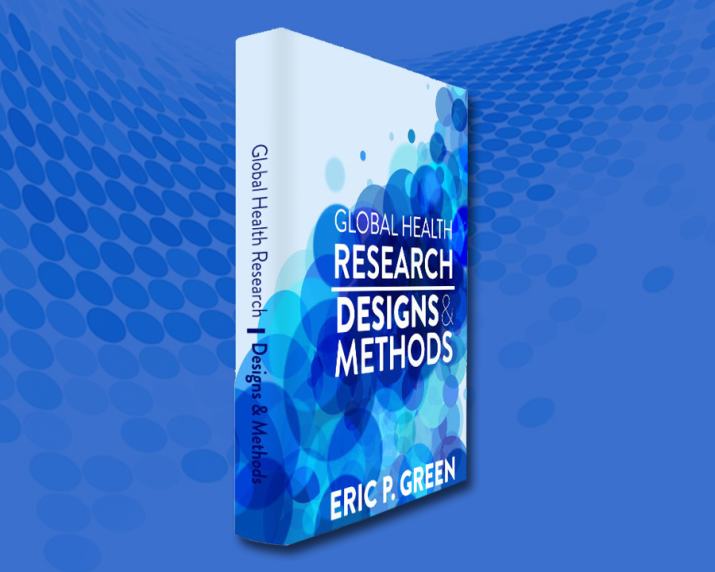When assistant global health professor Eric Green was working on his PhD in clinical psychology, he studied the classic psychology texts on research design and methods, which served him well—until he started teaching the “Research Methods in Global Health” course at Duke a few years ago. “After reviewing many excellent books that covered the basics,” he said, “I discovered that none of them integrated examples from this very diverse and interdisciplinary field.”
Green, who has an entrepreneurial spirit, decided to take matters into his own hands and write the textbook that would become the foundation of his course, along with lectures, interactive class activities and plenty of other reading materials. The e-book was published online in the fall of 2017.
Book Aims to Make Students Better Research Consumers and Producers
Designed for undergraduate or graduate courses, Global Health Research: Designs and Methods helps students become better consumers of research and prepares them to contribute to global health research teams. Students learn how to ask research questions, critically evaluate scientific literature, select an appropriate research design, develop a sampling and measurement plan and make an impact with their work.
Green’s colleague Liz Turner, assistant professor of biostatistics and bioinformatics and global health, gives the book high praise. “What’s particularly exciting about Eric’s book is that he has organized it in exactly the order that we typically approach a research question,” she said. “It guides students through the key steps to using a systematic and valid approach to research. I think it should be the go-to guide on research ‘how-to’ for all global health trainees.”
One guiding principle of the book is that global health students need to be students of medicine, biology, ecology, statistics, economics, psychology, public policy and many other disciplines. “I wanted to create a resource that would teach the basics of research design and methods by exposing students to real world global health examples from different disciplines,” Green said.
To help engage students in the content, Green incorporated multimedia elements such as videos and interactive aids, as well as callout boxes with tips and extended discussions. Post-doctoral fellow Amy Finnegan helped developed some of these elements.

A sample interactive element from Green's textbook.
Students Have Embraced the Book
Overall, Green says, both undergraduate and graduate students have enjoyed the learning experience the book provides.
“I love the book’s simple yet structured organization, and it’s easy to pick up where you’ve left off,” said Chaya Bhat ’19, an economics and global health major. “Unlike textbooks for most of my other classes, it’s quite succinct and written in an accessible style.”
Cyrus Elahi, a first-year Master of Science in Global Health student, who had never before used an e-book for a course, appreciated the easy online access to the book and the embedded figures and videos—not to mention the lighter backpack! He also commented that the online format simplified the process of creating flash cards with the online tool Anki.
Online Format Benefits Both Author and Readers
The book, which was funded in part by Duke Learning Innovation (formerly Online Duke), is still a work in progress. But Green, who has spent countless hours developing it over the last few years, believes “it’s finished enough to be out there.” In fact, he was drawn to the e-book format because it’s easy to change and add content. He enjoys the process of shaping chapters based on student feedback and his own observations of which parts work well and what parts need further development or clarification.
He’s also a strong proponent of open-access sources. Not only is the book publicly available at no cost, but whenever possible, he uses open-access examples to demonstrate concepts. “People are fed up with the outrageous cost of textbooks, and they’re difficult to update,” he said. “I’m a big fan of creating high-quality academic resources that people can access for free on the web.”
What’s Next for the Book
In addition to building on the current content, eventually Green would like to promote the book more widely, particularly to the Duke Global Health Institute’s international collaborators and the broader international academic community. Part of the continuous improvement process will be ensuring that the content and examples reflect a wide range of global health issues and cultural contexts.
Learn More:
- Check out Global Health Research: Designs and Methods
- Visit Green’s course website



